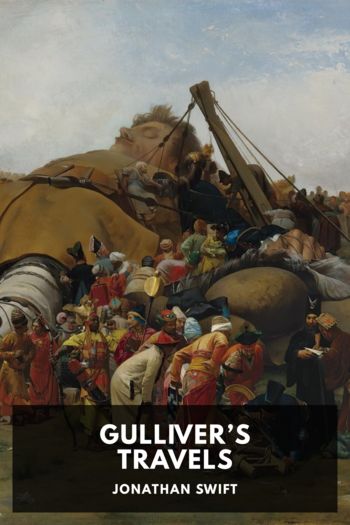Gulliver’s Travels - Jonathan Swift (self help books to read TXT) 📗

- Author: Jonathan Swift
Book online «Gulliver’s Travels - Jonathan Swift (self help books to read TXT) 📗». Author Jonathan Swift
The captain having been at Tonquin, was, in his return to England, driven northeastward to the latitude of 44 degrees, and longitude of 143. But meeting a trade-wind two days after I came on board him, we sailed southward a long time, and coasting New Holland, kept our course west-south-west, and then south-south-west, till we doubled the Cape of Good Hope. Our voyage was very prosperous, but I shall not trouble the reader with a journal of it. The captain called in at one or two ports, and sent in his longboat for provisions and fresh water; but I never went out of the ship till we came into the Downs, which was on the third day of June, 1706, about nine months after my escape. I offered to leave my goods in security for payment of my freight: but the captain protested he would not receive one farthing. We took a kind leave of each other, and I made him promise he would come to see me at my house in Redriff. I hired a horse and guide for five shillings, which I borrowed of the captain.
As I was on the road, observing the littleness of the houses, the trees, the cattle, and the people, I began to think myself in Lilliput. I was afraid of trampling on every traveller I met, and often called aloud to have them stand out of the way, so that I had like to have gotten one or two broken heads for my impertinence.
When I came to my own house, for which I was forced to inquire, one of the servants opening the door, I bent down to go in, (like a goose under a gate) for fear of striking my head. My wife run out to embrace me, but I stooped lower than her knees, thinking she could otherwise never be able to reach my mouth. My daughter kneeled to ask my blessing, but I could not see her till she arose, having been so long used to stand with my head and eyes erect to above sixty feet; and then I went to take her up with one hand by the waist. I looked down upon the servants, and one or two friends who were in the house, as if they had been pigmies and I a giant. I told my wife, “she had been too thrifty, for I found she had starved herself and her daughter to nothing.” In short, I behaved myself so unaccountably, that they were all of the captain’s opinion when he first saw me, and concluded I had lost my wits. This I mention as an instance of the great power of habit and prejudice.
In a little time, I and my family and friends came to a right understanding: but my wife protested “I should never go to sea any more;” although my evil destiny so ordered, that she had not power to hinder me, as the reader may know hereafter. In the meantime, I here conclude the second part of my unfortunate voyages.
Part III A Voyage to Laputa, Balnibarbi, Luggnagg, Glubbdubdrib, and Japan IThe author sets out on his third voyage. Is taken by pirates. The malice of a Dutchman. His arrival at an island. He is received into Laputa.
I had not been at home above ten days, when Captain William Robinson, a Cornish man, commander of the Hopewell, a stout ship of three hundred tons, came to my house. I had formerly been surgeon of another ship where he was master, and a fourth part owner, in a voyage to the Levant. He had always treated me more like a brother, than an inferior officer; and, hearing of my arrival, made me a visit, as I apprehended only out of friendship, for nothing passed more than what is usual after long absences. But repeating his visits often, expressing his joy to find me in good health, asking, “whether I were now settled for life?”





Comments (0)